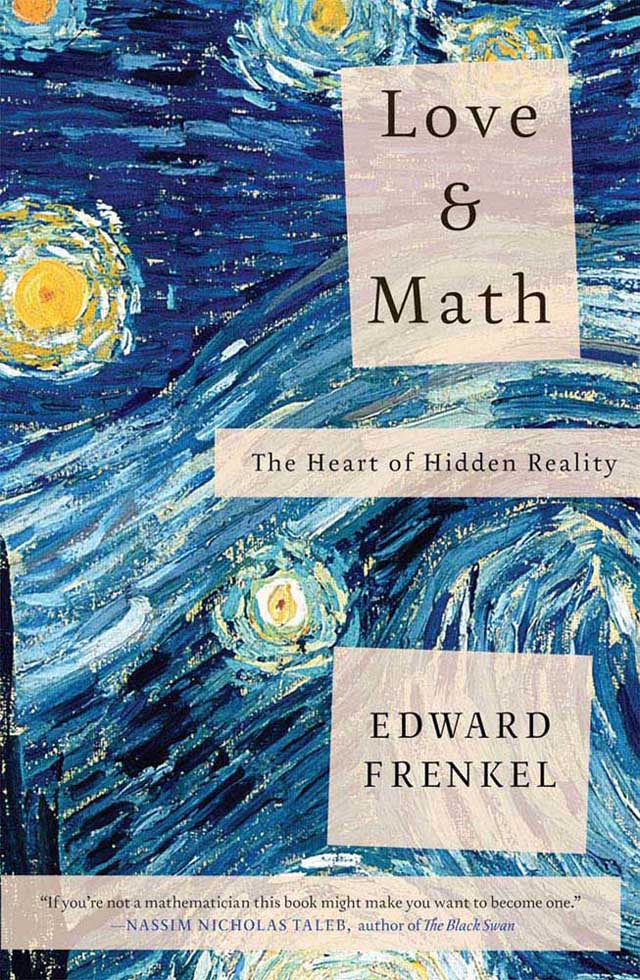
Love and Math
The Heart of Hidden Reality
کتاب های مرتبط
- اطلاعات
- نقد و بررسی
- دیدگاه کاربران
نقد و بررسی

August 12, 2013
U.C. Berkley mathematician Frenkel reveals the joy of pure intellectual discovery in this autobiographical story of determination, passion, and the Langlands program—a sort of “Grand Unified Field Theory of mathematics.” As a teenager Frenkel was “converted” from math hater to eager theorist by a mathematical friend of the family, enough to pursue it despite his struggles against an unapologetically anti-Semitic Soviet educational system. Frenkel writes casually of climbing over the fence to sit in on advanced classes at Moscow State University, a top school that didn’t accept Jews. With the help of mentors, he worked hard and eventually found his way to Harvard and the freedom to focus on his research. Frenkel balances autobiographical narrative with enthusiastic discussions of his own work on the Langlands program, a web of algebraic conjectures named after a Canadian mathematician that is noted for its usefulness in organizing seemingly chaotic data into regular patterns full of symmetry and harmony, and its applications to quantum theory. While the math can be heavy going, Frenkel’s gusto will draw readers into his own quest, pursuing the deepest realities of mathematics as if it were “a giant jigsaw puzzle, in which no one knows what the final image is going to look like.” B&w illus.

August 1, 2013
"Math" and "love" seldom go together, but the title here fits this book. Frenkel (mathematics, Univ. of California, Berkeley) has had a lifetime love affair with uncovering mathematical secrets. The autobiographical portion of this book proves to be fascinating. As a Jew in Soviet-era Russia, where he was born in 1968, Frenkel fought against prejudice to receive a topflight mathematical education, much of it outside the traditional path. Frenkel's early work was so well received that he was invited to be a visiting professor at Harvard while still finishing his undergraduate degree in Russia. All the while, his passion to understand the mysteries of math drove him, enabling him to immerse himself so completely in his research as to facilitate the complex discoveries that brought him prestige. Intertwined with his memoir is information that will help readers see the beauty of mathematics. By using analogies, he describes concepts such as symmetries, dimensions, and Riemann surfaces in a way that will enable nonmathematicians to understand them. VERDICT Whether or not readers develop a love for math, they will get a glimpse of the love that Frenkel has for the subject. Recommended for all readers, math whizzes or not, inclined to be interested in the subject.--William Baer, Georgia Inst. of Technology Lib., Atlanta
Copyright 2013 Library Journal, LLC Used with permission.

September 15, 2013
An award-winning mathematician explains his passion for pure mathematics, a subject that reveals a "hidden parallel universe of beauty and elegance, intricately intertwined with ours." Growing up in the last days of the Soviet Union, Frenkel (Mathematics/Univ. of California) benefited from the richness of a mathematical culture that still survived despite the brutally oppressive regime. Jews were denied education in fields such as mathematical physics, which were considered important for national security. As the son of a Jewish father, Frenkel was denied admission to Moscow State University (despite his brilliant showing on entrance exams) and tracked instead to study applied mathematics at a different school. Frenkel's parents, who worked as professional engineers in an industrial town 70 miles from Moscow, had recognized the brilliance of their son and enlisted a local college professor to mentor him in higher mathematics while he was still in secondary school. Through this professor, the author gained access to a circle of top Soviet mathematicians in Moscow, who allowed him to secretly attend seminars at the university and gave him challenging problems to solve. Fortunately for him, with Gorbachev's rise to power, Frenkel was allowed to immigrate to the United States and attend Harvard. "Suddenly, as if by a stroke of black magic, it all became clear to me," he writes of his first independent discovery. The author's specialty became the "Langlands Program," which unites abstract algebra and topology and ultimately has provided insights into quantum theory. Frenkel's attempts to explain the mathematical search for symmetries among different operations (beginning with modular arithmetic and leading ultimately to the behavior of quarks) will be difficult for the mathematically unversed to follow. A fascinating peek into the author's life and work.
COPYRIGHT(2013) Kirkus Reviews, ALL RIGHTS RESERVED.

October 15, 2013
After Rick and Isla meet at a dinner party and fall in love, what's next? For Frenkel, it is the mathematical charting of the Rick-Isla relationship as a trajectory on the x-y plane. The surprising notion of a formula of love fits into the remarkable understanding of math Frankel unfolds as he recounts his labors on conceptual frontiers where an audacious new master theory, the Langlands Program, is linking geometry, number theory, and algebra. To qualify for a role in those labors, Frenkel defied the anti-Semitism pervading the Soviet academic world in which he came of age and then won appointment to a Harvard professorship. Aware that few of his readers share his academic training, Frenkel pares the technical details to a minimum as he reflects on the platonic transcendence of mathematical concepts and marvels at their mysterious utility in explaining physical phenomena. Not merely dry formulas in textbooks, the math Frenkel celebrates fosters freedom and, yes, even distills the essence of love. A breathtaking personal and intellectual odyssey.(Reprinted with permission of Booklist, copyright 2013, American Library Association.)

























دیدگاه کاربران